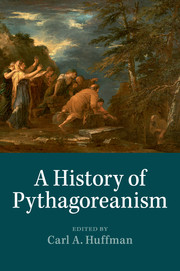Book contents
- Frontmatter
- Contents
- Contributors
- Abbreviations
- Introduction
- Chapter 1 Pythagoras
- Chapter 2 Philolaus
- Chapter 3 Archytas
- Chapter 4 Sixth-, fifth- and fourth-century Pythagoreans
- Chapter 5 The Pythagorean society and politics
- Chapter 6 The Pythagorean way of life and Pythagorean ethics
- Chapter 7 Pythagoreans, Orphism and Greek religion
- Chapter 8 The problem of Pythagorean mathematics
- Chapter 9 Pythagorean harmonics
- Chapter 10 The Pythagoreans and Plato
- Chapter 11 Aristotle on the “so-called Pythagoreans”: from lore to principles
- Chapter 12 Pythagoreanism in the Academic tradition: the Early Academy to Numenius
- Chapter 13 The Peripatetics on the Pythagoreans
- Chapter 14 Pythagoras in the historical tradition: from Herodotus to Diodorus Siculus
- Chapter 15 The pseudo-Pythagorean writings
- Chapter 16 Pythagoreans in Rome and Asia Minor around the turn of the common era
- Chapter 17 Diogenes Laertius’ Life of Pythagoras
- Chapter 18 Porphyry's Life of Pythagoras
- Chapter 19 Iamblichus’ On the Pythagorean Life in context
- Chapter 20 Pythagoras and Pythagoreanism in late antiquity and the Middle Ages
- Chapter 21 Pythagoras in the Early Renaissance
- Bibliography
- General index
- Index locorum
- Greek index
- References
Chapter 16 - Pythagoreans in Rome and Asia Minor around the turn of the common era
Published online by Cambridge University Press: 05 May 2014
- Frontmatter
- Contents
- Contributors
- Abbreviations
- Introduction
- Chapter 1 Pythagoras
- Chapter 2 Philolaus
- Chapter 3 Archytas
- Chapter 4 Sixth-, fifth- and fourth-century Pythagoreans
- Chapter 5 The Pythagorean society and politics
- Chapter 6 The Pythagorean way of life and Pythagorean ethics
- Chapter 7 Pythagoreans, Orphism and Greek religion
- Chapter 8 The problem of Pythagorean mathematics
- Chapter 9 Pythagorean harmonics
- Chapter 10 The Pythagoreans and Plato
- Chapter 11 Aristotle on the “so-called Pythagoreans”: from lore to principles
- Chapter 12 Pythagoreanism in the Academic tradition: the Early Academy to Numenius
- Chapter 13 The Peripatetics on the Pythagoreans
- Chapter 14 Pythagoras in the historical tradition: from Herodotus to Diodorus Siculus
- Chapter 15 The pseudo-Pythagorean writings
- Chapter 16 Pythagoreans in Rome and Asia Minor around the turn of the common era
- Chapter 17 Diogenes Laertius’ Life of Pythagoras
- Chapter 18 Porphyry's Life of Pythagoras
- Chapter 19 Iamblichus’ On the Pythagorean Life in context
- Chapter 20 Pythagoras and Pythagoreanism in late antiquity and the Middle Ages
- Chapter 21 Pythagoras in the Early Renaissance
- Bibliography
- General index
- Index locorum
- Greek index
- References
Summary
Introduction
Given the state of the evidence, studying the history of Pythagoreanism is often harsh training in recognizing our ignorance. The situation may look less bleak for the Roman world during the centuries around the turn of the era, but this impression is deceptive. Admittedly, we do have a considerable body of evidence for people credited with Pythagorean beliefs and a Pythagorean lifestyle. On closer inspection, however, much of this information turns out to be dubious. To mention just one example, most information about the first-century-AD Pythagorean philosopher Apollonius of Tyana comes from a heavily fictionalized biography written in the third century by the Athenian sophist Philostratus. Most scholars doubt whether Philostratus’ Life of Apollonius can be used with any confidence as evidence for the historical Apollonius. Moreover, the non-Philostratean evidence probably gives us access to second-century traditions about the Cappadocian sage rather than to the first-century historical figure. This complicated evidential situation is not unrepresentative: there is evidence for the posthumous reputations rather than for the views and practices of the historical figures concerned, and although one can argue that their life and work offered a starting-point for the development of such reputations, it is not a foregone conclusion that this was provided by conscious Pythagoreanism.
In addition, during the centuries around the turn of the era “Pythagorean” was a label with diverging connotations, not all of them positive. Its denotation was, of course, “an adherent of a set of doctrines going back to the sixth-century BC philosopher Pythagoras.” Quite often, however, this denotation was combined with or even superseded by the connotation “meddler in the supernatural.” One of the recurring questions in this chapter will be what earned someone the label of “Pythagorean”; in answering that question, doctrine will turn out to be of secondary importance. Nor was Pythagoreanism predicated on membership of an organization. The claim that Pythagoreanism was an organized movement in Rome around the turn of the common era cannot be easily substantiated; the available evidence can be better reconciled with Pythagoreanism being a matter of individual choice and individual practice – which, of course, does not exclude contacts between kindred souls and the passing on of ideas through successive generations. Such individual choices should be understood against the background of the availability among the educated of knowledge of Pythagorean views in general and of (pseudo-)Pythagorean literature in particular.
Keywords
- Type
- Chapter
- Information
- A History of Pythagoreanism , pp. 341 - 359Publisher: Cambridge University PressPrint publication year: 2014
References
- 8
- Cited by



